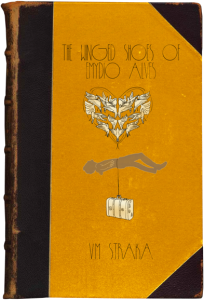The Winged Shoes of Emydio Alves was published in 1942. This was around the time that many alleged members of the “S” were dying or leaving the group for other reasons. In Ship of Theseus, Straka writes “He wonders what it must feel like to be among the last—or to be the very last—of your kind.” F.X.C. responds that “Straka confessed to me—in a note in the margins of Winged Shoes manuscript, no less—that he had begun to suffer from this very feeling, as a group to which he belonged (uneasily and/or tangentially, I assume, given his social limitations) and been losing its constituents rapidly” (347).
Winged Shoes is considered to be one of Straka’s most personal works, and is even regarded as “romantic” in some cases. The title draws reference to the Roman god Mercury, the god of abundance and commercial success, and Hermes, a god of transitions and boundaries.
The Winged Shoes of Emydio Alves was highly criticized for being a failed political message, but F.X. Cordillera defends it in the footnotes (259,418). She cites a review, which is not on record, that was supposedly published in the Portland Clarion on September 10, 1942. The coordinates of Portland, OR are later used as a part of the Chapter 10 cipher. September 10, 1942 was also the date of a partial solar eclipse. In this review, FXC writes that K.R. Simmons “understood that the book was not a failed novel of world politics but an exceptional and revelatory work of personal emotion.” It is likely that FXC felt a special connection to this work because she saw it as a strengthening moment in her relationship with VMS.
The main character is Emydio Alves, from the “sunken city,” which is paralleled in both Coriolis and Ship of Theseus as a “sudden city.” Emydio wears the status symbol of winged shoes, but when he is captured by Viscount’s army, he is stripped of his titular shoes, and forced to work in the fields wearing “a dead man’s boots” (219). His apparent love interest is assumed to be the fifth daughter of the Prince of Santiago.
Jen quotes The Winged Shoes of Emydio Alves, saying
“If I’m going to die, I’ll damned well die on a beach.”
This is relevant to her feelings regarding many major decisions, such as choosing to focus on studying Straka, rather than the classes she needs to graduate.
Back to Works By


You must be logged in to post a comment.